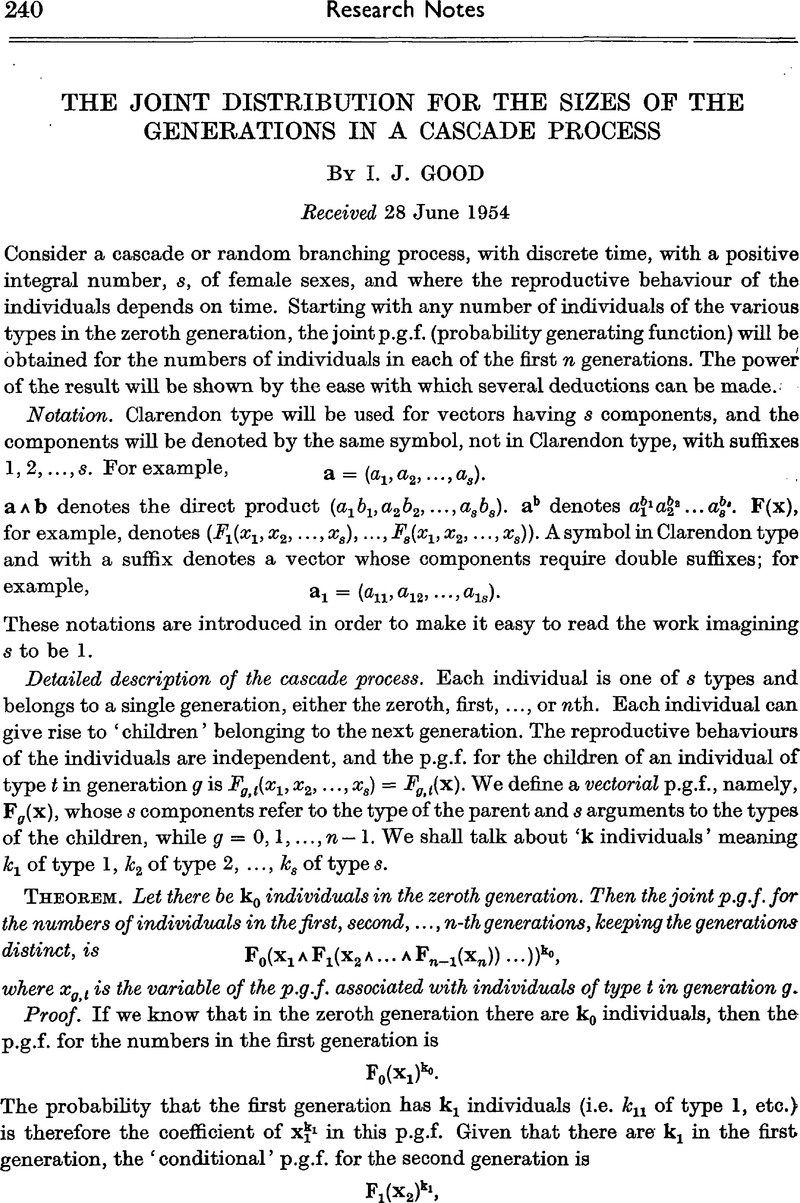Crossref Citations
This article has been cited by the following publications. This list is generated based on data provided by Crossref.
Good, I. J.
1960.
Generalizations to several variables of Lagrange's expansion, with applications to stochastic processes.
Mathematical Proceedings of the Cambridge Philosophical Society,
Vol. 56,
Issue. 4,
p.
367.
1962.
Good’s theory of cascade processes applied to the statistics of polymer distributions.
Proceedings of the Royal Society of London. Series A. Mathematical and Physical Sciences,
Vol. 268,
Issue. 1333,
p.
240.
Good, I. J.
1965.
The generalization of Lagrange's expansion and the enumeration of trees.
Mathematical Proceedings of the Cambridge Philosophical Society,
Vol. 61,
Issue. 2,
p.
499.
Ogawa, Iwao
and
Furukawa, Masao
1968.
The multiplicative process in semiconductor radiation detectors. A practical application of Good's theorem in the theory of branching processes.
Mathematical Proceedings of the Cambridge Philosophical Society,
Vol. 64,
Issue. 1,
p.
203.
Kajiwara, Kanji
1971.
Statistics of Randomly Branched Polycondensates.
The Journal of Chemical Physics,
Vol. 54,
Issue. 1,
p.
296.
Gordon, M.
Kajiwara, K.
Peniche‐Covas, C. A. L.
and
Ross‐Murphy, S. B.
1975.
Dilute solution properties of critically branched systems.
Die Makromolekulare Chemie,
Vol. 176,
Issue. 8,
p.
2413.
Parker, T. G.
and
Dalgleish, D. G.
1977.
The theory of branching processes applied to milk proteins: I. Heat-induced coagulation of whole milk.
Journal of Dairy Research,
Vol. 44,
Issue. 1,
p.
85.
Kennedy, J. W.
1978.
Theory and Applications of Graphs.
Vol. 642,
Issue. ,
p.
314.
Gonzalez, A E
and
Daoud, M
1981.
Vulcanisation of a binary mixture of long polymers.
Journal of Physics A: Mathematical and General,
Vol. 14,
Issue. 9,
p.
2441.
Burchard, Walther
1983.
Light Scattering from Polymers.
Vol. 48,
Issue. ,
p.
1.
González, Agustín E.
1987.
Lattice magnetic analog of branched polymers, lattice animals, and percolation. II. Correlation functions and generalizations.
Physical Review A,
Vol. 35,
Issue. 8,
p.
3499.
Gross, Robert
Yarmush, Martin L.
Kennedy, John W.
and
Quintas, Louis V.
1988.
Antigenesis: A cascade-theoretical analysis of the size distributions of antigen—antibody complexes.
Discrete Applied Mathematics,
Vol. 19,
Issue. 1-3,
p.
177.
KENNEDY, JOHN W.
and
QUINTAS, LOUIS V.
1989.
Probability Models for Random f‐Graphs.
Annals of the New York Academy of Sciences,
Vol. 555,
Issue. 1,
p.
248.
Chen, Zhong S.
Kennedy, John W.
and
Quintas, Louis V.
1990.
The Long and the Short of Cascade Trees: Height and a Duality in Cascade Processes a.
Annals of the New York Academy of Sciences,
Vol. 607,
Issue. 1,
p.
14.
Suematsu, Kazumi
and
Kohno, Minoru
2000.
Estimation of critical points of branched polymers.
Physical Review E,
Vol. 62,
Issue. 3,
p.
3944.
Burchard, W.
and
Vogel, H.J.
2000.
Particle scattering form factors of chemical and conformational triblock copolymers.
Computational and Theoretical Polymer Science,
Vol. 10,
Issue. 1-2,
p.
133.
Kuljanin, J.
Vujicic, G. M.
Radojcic, M.
and
Milosavljevic, B. H.
2000.
The relations between absorbed dose, molecular mass distribution, and viscosity studied on aqueous solution of ovalbumin agglomerated by ? irradiation.
Journal of Polymer Science Part B: Polymer Physics,
Vol. 38,
Issue. 13,
p.
1729.
Ikeda, Yuko
Kanji Kajiwara, And
Yuguchi, Yoshiaki
Urakawa, Hiroshi
Hirata, Yoshitaka
and
Kohjiya, Shinzo
2001.
Polymer Gels and Networks.
Lechowicz, J. B.
and
Galina, H.
2001.
Gel Points in Selected Models of Network Polymerisation.
International Polymer Science and Technology,
Vol. 28,
Issue. 12,
p.
46.
Nakao, Toshio
Tanaka, Fumihiko
and
Kohjiya, Shinzo
2002.
Cascade Theory of Substitution Effects in Nonequilibrium Polycondensation Systems.
Macromolecules,
Vol. 35,
Issue. 14,
p.
5649.



